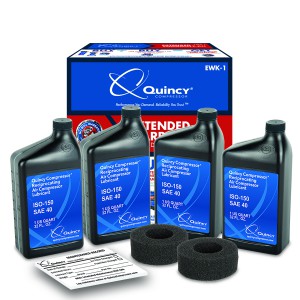
 As with most engine-powered equipment, air compressor motors require lubrication to keep them operating efficiently and minimize the impact of wear and tear, as well as to cool and seal internal engine components. Proper lubrication can also reduce your energy costs. By reducing friction, lubricants reduce heat and lower the compressor’s energy consumption.
As with most engine-powered equipment, air compressor motors require lubrication to keep them operating efficiently and minimize the impact of wear and tear, as well as to cool and seal internal engine components. Proper lubrication can also reduce your energy costs. By reducing friction, lubricants reduce heat and lower the compressor’s energy consumption.
While there are oil-free compressors on the market, most models require the use of compressor oil to provide essential lubrication. What follows is helpful information about the different types of compressor fluid and how to select the best oil for air compressor products.
Synthetic Oils for Air Compressor Use
While there are several types of air compressor oil products for both rotary screw and reciprocating models, many manufacturers recommend using synthetic oils, as these contain no additives or sulfur that can produce a build-up on valve backs and faces. Key benefits of synthetic oils include:
- Rotary screw air compressors: In rotary screw compressors, synthetic oils can provide up to 8,000 hours of extended oil service life. They can also reduce the sludge, varnish and other deposits that can inhibit compressor performance and lead to premature wear. Synthetic oils will produce cooler oil temperature and a cooler discharge of compressed air. What’s more, synthetic oils can lead to a reduction in overall oil consumption, which means you won’t need to add oil as frequently.
- Reciprocating air compressors: In reciprocating air compressors, synthetic compressor oil will reduce the amount of carbons that accumulate on compressor valves, as well as significantly lower oil feed rates. They also feature higher flash points and higher auto ignition temperatures. Synthetic oils can prevent premature wear on piston rings and packings, adding to the equipment’s life.
Factors to Consider When Choosing Air Compressor Pump Oil
When choosing an air compressor oil, the first thing to consider is the compressor’s oil viscosity requirements. An SAE 30 weight oil is recommended for compressors that operate in conditions where the temperature ranges from 34° to 100° F. An SAE 20 weight oil is the better choice for colder conditions. Other factors to consider include:
- Ability to protect against rust and corrosion
- High oxidation stability, which helps to maintain viscosity and extend oil service life
- Ability to shed water (demulsibility)
- Whether it can be sufficiently filtered without depleting essential lubricant additives
While you should use your manufacturer’s specifications as a guide, choosing an oil that exceeds the minimum specs can result in better performance and, ultimately, longer compressor equipment life.
What Causes Premature Oil Failure?
Running your compressor at high temperatures for extended periods of time will cause your oil to form a thin layer throughout the inside of your compressor. Consequently, the compressor’s oil cooler will not be able to work properly, resulting in even higher temperatures and eventual compressor shutdown.
Quincy Compressor Features a Complete Selection of Oil and Replacement Air Compressor Oil Filters
Our expert partners carry a complete selection of fluids and compressor oil filters for our reciprocating and rotary screw models. They can assist you with selecting just the right fluid for your needs.





